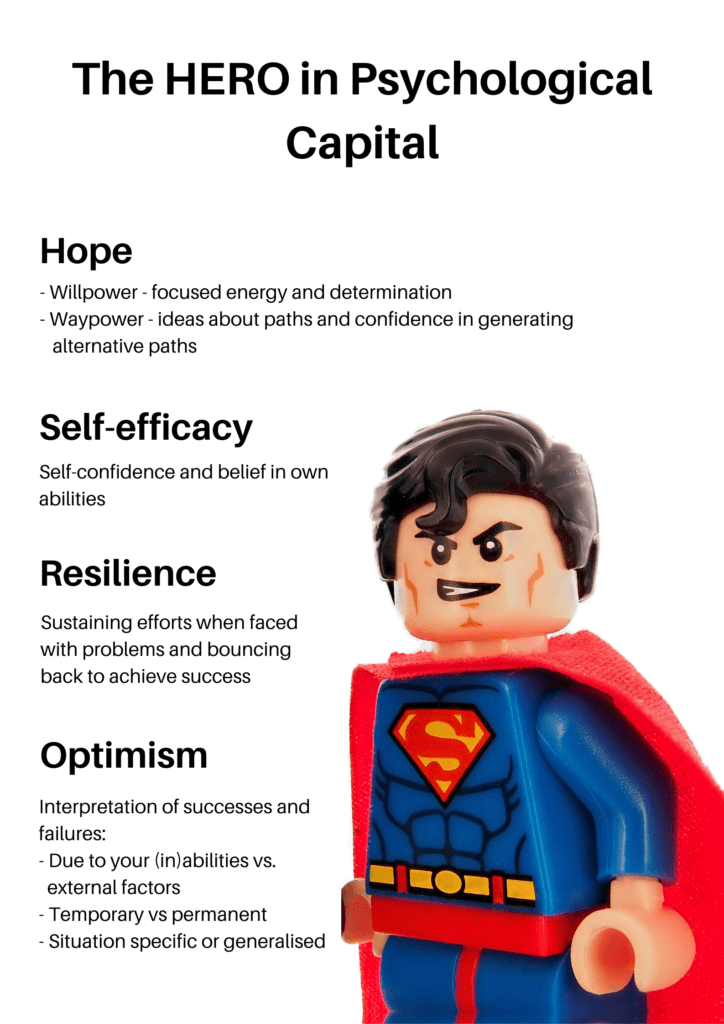
Search ‘Stress’ in Google and you get 1.2bn instant hits. Read the first couple of pages and you immediately form a view on how negative stress is – the “health epidemic of the 21st century”, “one of the biggest health hazards in the workplace“. Now think about how many times in the last couple of weeks you’ve thought ‘I’m so stressed at work’. If you don’t manage this stress well, you risk burning out. But this needn’t be the case and I’ll take you through how to reduce work stress effectively.
Think about a time when you were under stress and things actually seemed to ‘flow’. This is because stress can also be positive and lead to better performance, motivation, job satisfaction. And there’s one individual characteristic which research has shown time and time again how important it is for turning negative stress experience into something positive – Psychological Capital.
I’ve used exactly these strategies for managing stress in the workplace to turn mine and my clients’ stressful experiences at 180 Degrees. So are you ready to adopt these in your life too and turn stress from your worst enemy into your ally ? We will uncover:
1. What is in fact psychological capital – a definition and practical example.
2. How to actually develop psychological capital – the exact tools you need.
What is Psychological Capital?
In scientific terms, psychological capital is defined as the positive mindset state characterised by hope, self-efficacy, resilience and optimism, or HERO.
In simple terms, it is the ‘I can and will deal with this difficult situation’ attitude. You feel confident in setting and achieving goals to address unexpected problems and situations, self-assured in your ability to deal with setbacks, and optimistic about recovering from these and moving on.
Research in psychological capital in the workplace has found that individuals, who score high, experience significantly fewer stress symptoms. In contrast, those who lacked these HERO characteristics reported higher levels of stress and were more likely to want to give up and quit their job. Note the actual levels of stress were similar. This means that people had a comparable number of things which stress them out. But those who had high psychological capital felt like they experienced less stress. They were the masters of the stress and not vice versa!
Definitions

A HERO example
After reading these definitions, let’s illustrate how these work together to determine your stress reaction and coping. Say you’re tasked with a difficult project with a short deadline, the main stakeholder is an a*shole and on top of that, you’ve already got other competing priorities to deal with. Some parts of the projects are going well despite these challenges, but one of the main deliverables is behind.
Self-efficacy impacts how you feel about coping with these challenges, as well as how successful you actually are in doing so.
Optimism determines how you interpret these successes and failures. Do you have faith in your own ability to improve the situation? Rather than automatically assume it is your fault, the success cannot be repeated and the failure is even likely to spread beyond this issue?
Do you then allow yourself to give up because one part of the project is failing? Or you demonstrate resilience, face the challenge, sustain your efforts and bounce back and beyond?
And finally, hope determines your energy and determination to actually set goals and paths to turn the challenges around and achieve success.
The Exact Tools You Need to Develop Your HERO
Developing your psychological capital, or HERO, won’t happen overnight. It requires your active involvement both before stressful events happen, as well as every time when you’re actually faced with a challenge. But using these tools and exercises will certainly help you develop it gradually, reduce work stress and turn it from your enemy into your ally.
 How to Reduce Work Stress: Self-Reflection and Positivity Talk
How to Reduce Work Stress: Self-Reflection and Positivity Talk
Some people are naturally better at feeling good about their abilities and successes. But others tend to be more self-critical, blaming ourselves when things go wrong and not believing in ourselves when faced with challenges. There isn’t really a right or wrong way – there needs to be a balance. Having high self-belief and confidence doesn’t mean risking things. Or not taking responsibility when you’ve made a mistake and blaming it on something beyond your control instead. But with the right exercises, you can achieve that balance, improve your confidence and belief in your abilities to deal with challenges.

Exercise 1: Positive self-talk.
- Do this every day for a minute in the morning to start your day positive, confident and believing in yourself
- You can also do this ahead of a stressful situation, such as meeting with that a*shole stakeholder.
- Stand in an open power pose with your legs firm on the ground, power arms and head high – power posing is shown to positively impact your psychological state increasing feelings of power and decreasing levels of cortisol, the stress hormone.
- Use words such as “I am” followed by a positive statement.
- Remind yourself what your strengths are. Keeping this on top of mind will help you use them when faced with a challenge.
And if you’re going through particularly difficult times, check out these 9 ways to stay positive and strong in tough times.
 How to Reduce Work Stress: Thinking Check
How to Reduce Work Stress: Thinking Check
So far you’ve started developing your self-efficacy, hope and optimism. The next exercise is designed to help you when you’re actually in a stressful situation and your thinking can get the better of you and sets you in a pessimistic, failing mindset.
Exercise 2: Healthy vs unhealthy thinking check.
We sometimes get caught in a negative thinking spiral where negative attitudes give rise to more negative thoughts and behaviours. Alternatively, we can set ourselves in a positive mindset even when faced with a difficult stressful situation. I recommend you to spend 5 min when faced with such a situation reflecting on your thoughts. You can see some example pessimistic thinking thoughts on the left. These should be replaced with healthier, optimistic thoughts on the right.
| Pessimistic, failing thinking | Optimistic, resilient thinking |
|---|---|
| I am tired. I just can’t think of ways of solving this problem. | I will be able to deal with this. Let me think of similar situations I’ve been in before. What did I do? Or I can check what others have done? Even Google may know the answer. This will help me put a plan together. |
| I’ve got so much going on both at home and at work. And on top of that now I have a new boss. I feel like this is going to last forever and if one thing crumbles I will end up failing in everything. | It will be demanding to also have to prove myself to the new boss. But now is the time to keep going. With the right plan and prioritisation, I can sustain my effort and succeed without burning out. |
| There are too many challenges and question marks. And I just don’t have the right skills set to deal with these. If my team fails to deliver, it will be because of me. | Even though I don’t have all of the skills I can do some research and/or seek help from a more experienced person to find a solution. This will not only help me succeed but also allow me to develop new skills and connections. |
| Since the restructuring, my role is so undefined and changes constantly. This ambiguity is making me feel very uncertain about my ability to do it. | Since the restructuring, my role is so undefined. But this is a great learning opportunity. I can experience new things, develop new skills and build resilience by coping with the challenges every new day poses. |
| I am constantly under pressure. Things seem to not be getting any better. It seems like this has become part of who I am now. | I feel under pressure. But this is only temporary and doesn’t mean things will be this way forever. Whilst pressure motivates me, I know this is not sustainable in the long term. So I will not allow it to become part of who I am. |
 How to Reduce Work Stress: Action Planning
How to Reduce Work Stress: Action Planning
You’ve built your confidence and self-belief, you’ve identified some unhelpful thoughts and how to change your thinking. It’s now time for action planning for when you’re faced with a stressor to get to a healthy solution rather than bury your head in the sand. It will become more and more natural the more you do it and will eventually feel like second nature. So you actually won’t even perceive it as a stressor but as an opportunity to become more resilient and re-affirm your self-belief and determination.
Exercise 3: Stressful situation action planning.
- Identify what exactly is causing you the stress.
- Write down a specific goal in relation to this stressor.
- Now rewrite this goal as a desirable “approach-goal”. What is it you do want, instead of what you don’t want? E.g. don’t say you want less pressure, say you want more relaxation time, support from your manager, time to do a project, etc.
- Brainstorm all the kinds of actions you can take to minimise the impact of this stressor.
- Ask others to brainstorm with you. These actions may be anything– it’s about quantity, not quality.
- Choose your best 3 ideas and write down all their potential obstacles. For each obstacle, write down what you could do to overcome it (e.g. ask for help, try a different approach, sacrifice something, persevere for a certain period etc.)
- Now execute the first step towards your goal. Good luck!
This goal setting plan is adapted from here for coping with stress. But if you’re not sure what exactly you can do, cause you feel like the cause of your stress if beyond your control, check out these practical tips on effectively managing stressful changes in your life which includes doing a SWOT analysis to help you take action.
Reduce your work stress levels and ability to cope by adopting these psychological capital ‘HERO’ tools and exercises. If you found them useful share them with your friends and colleagues via the social media buttons below and help them reduce their stress levels.

If you’re going through a particularly stressful time because of a big work or life change, check out this article on how to manage change in your life effectively.
But if you feel overwhelmed or don’t know where to start get in touch for individual coaching and support – for a healthier and happier life with stress turned into your ally.














What do you think?